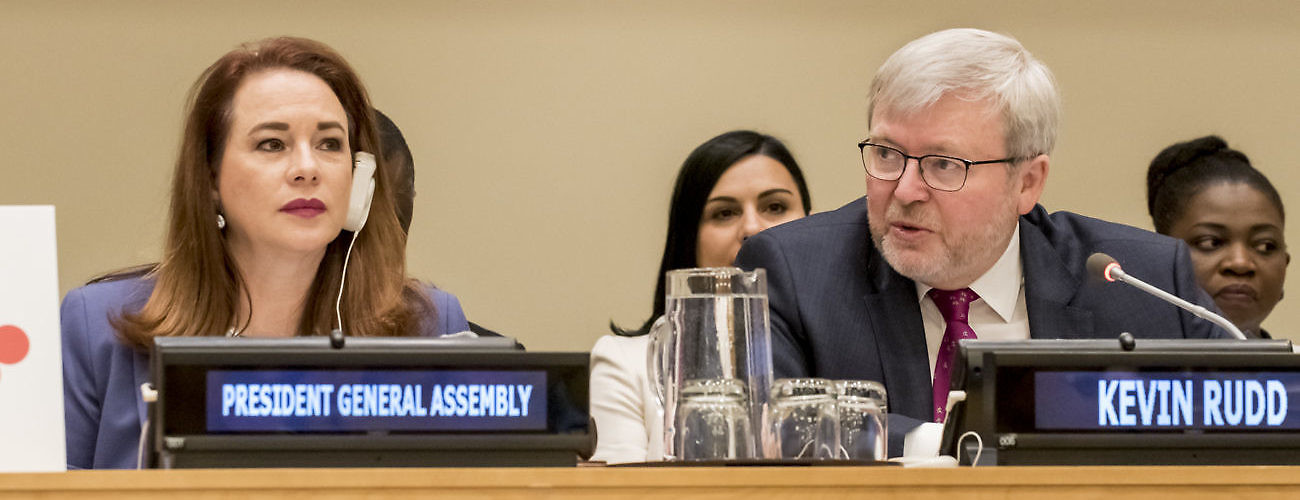“Those of us seeking to be active supporters of the UN over many years and decades understand very well that the system itself is under challenge, multilateralism as a concept of governance is under deep challenge,” IPI Chair Kevin Rudd told a United Nations event organized by IPI and the Office of the President of the General Assembly (PGA).
For her part, General Assembly President María Fernanda Espinosa Garcés said, “Building trust in the multilateral system means building trust in its beating heart, the UN. We need to show this institution can be more transparent, efficient, and respectable.”
Both were speakers at the April 23rd event, an interactive discussion at the UN on Building Trust and the Importance of Multilateralism: Making the UN Relevant to All People.
Sakiko Fukuda-Parr, Professor of International Affairs and Program Director at The New School, said she thought the greatest threat to making multilateralism meaningful was the rising inequality in the world. “Economic inequality translates into exclusion and inequality in political power, voice, and influence, and the current global economy does not have a level playing field,” she said. Exacerbating the problem, she claimed, were four “biases”: large economy bias; financial and corporate interests bias; governance bias, and shrinking policy space for states to pursue public priorities. “Modern multilateralism needs new principles because the realities of today are very different from the 20th century,” she said.
Elaborating on the point, economist Cecilia Nahón, Executive Director, Model G20 Initiative, American University, and former Ambassador of Argentina to the US, said, “All over the world, people have good reason to believe that the global economy has been working to benefit the few rather than the many.” She quoted figures on global income over the past 25 years showing that the top one percent of earners captured 27 percent of total growth while the bottom 50 percent captured only 12 percent.
She said that multilateralism had worked in some key areas of the UN’s concern like the reduction of poverty but had disappointed in many others like the promises on inclusion, prosperity, and sustainability. To reverse this, she proposed that “rule takers of the rules written mostly by major global corporations and banks — the UN and the people of the world — can become rule challengers and eventually rules changers.”
Richard Gowan, the International Crisis Group’s UN Director, focused his remarks on security affairs where he said multilateralism had been very successful in curbing conflict and weapons proliferation by emphasizing the merits of trust, transparency, and truth. “That multilateral framework of trust has succeeded in keeping the world very safe over the last three decades.” He called this an “immense achievement” but warned that it was one that in the rapidly modernizing world was “slipping away.”
“The transparent security system that has kept us safe is weakening,” he said. “We are seeing new phenomena in security affairs, the weaponization of artificial intelligence, cyber weapons and technologies. For those there are no worthwhile trust building mechanisms. Weapons of the future are uncontrolled, unregulated, and states cannot trust each other with these new weapons systems. If we are to sustain a multilateral architecture that we can trust, we need to find ways to restore transparency around all weapons systems and new weapons systems, because otherwise we cannot cooperate around security at all.”
Giovanna Kuele, Member of the Together First Steering Committee, and non- resident research fellow at the Igarapé Institute in Rio de Janeiro, said that “many people are skeptical of the international community to keep the promises it makes, but at the same time people understand that multilateralism is our only option.” She suggested what they wanted was a “different kind of multilateralism. It is about more than states, it is about people working together to achieve their common goal.”
Donald Steinberg, Executive Director of Mobilizing Men as Partners for Women, Peace, and Security, framed his remarks around the centrality of the Sustainable Development Goals in connecting the work of the UN with those in need of it. “The SDGs are an historic first step forward to linking the UN multilateral system to all people and building trust in global cooperation,” he said. “The SDGs are a powerful symbol and entry point for UN relevance in the lives of all people whether people live in skyscrapers, urban slums, rural villages or even refugee camps.” He added, though, that the UN wasn’t taking full advantage of this to become relevant in the lives of people. “Regrettably,” he said “SDG implementation has been uneven, with significant delays and backsliding common.”
He urged the UN to redouble its efforts to advance the SDGs. “Leaders should launch aggressive public awareness campaigns in their own countries stressing that the goals are universal, interconnected, and achievable. Optimism is a force multiplier, people must know we’ve already cut the numbers of those living in extreme poverty over the last decades by more than half, and have made similar advances in health, education, and food security.”
In that same vein, Mr. Rudd called on people who believe in the UN and multilateralism to stick up for it. “Whenever this thing is attacked, let’s not be silent,” he said. “We need to defend the institutions. When a particular state takes it upon themselves to attack the institution, we have a general responsibility to defend it, to tell the good stories of the UN as well.”
Ms. Espinosa concluded her remarks by citing what she called the existential paradox of multilateralism. “It’s both a challenge but also a great opportunity, it has given us the possibility to unite more, to recommit, to refine our own narrative, and to find common denominators,” she said. With an apology for adding to the glut of acronyms around the UN, she said she had created a new one to delineate the best way forward for the world body — DARE, standing for Delivery, Accountability, Relevance, and Efficiency.








